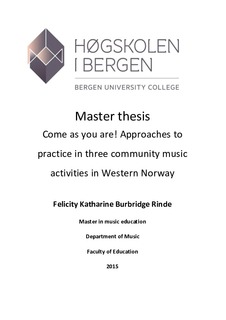| dc.contributor.author | Rinde, Felicity Burbridge | |
| dc.date.accessioned | 2018-02-01T14:40:52Z | |
| dc.date.available | 2018-02-01T14:40:52Z | |
| dc.date.issued | 2015-05-15 | |
| dc.identifier.uri | http://hdl.handle.net/11250/2481392 | |
| dc.description | Masteroppgave i musikkpedagogikk | en_GB |
| dc.description.abstract | This master's thesis looks at the work of a selection of music teachers who choose to work in non-curricular music education settings providing open-access music making opportunities, defined by the author as community music activities, for various groups in the population. These activities may be said to have affordances beyond the aims of music learning, teaching, rehearsing and performance. Following a brief introduction to the relatively new academic field of community music and its ethos of cultural democracy, the research question – What approaches to practice can be found among professional leaders of three community music activities in Western Norway? – is investigated through semi-structured qualitative research interviews with four informants, all of whom might be said to be pioneers in their respective fields. Using thematic analysis of the empirical material the researcher identifies a number of approaches to practice. The approaches identified in this thesis are: offering a warm welcome, creating a path of no mistakes, unleashing latent resources (resource-oriented teaching methods), planning for the unknown, and facilitating listening skills and entrainment. The analysis also reveals findings on the role of the leader, approaches to quality, relational aspects in group music making, and the subject of music as a kind of language. The informants’ practice is analysed in the light of two works of community music theory. Lee Higgins' Community Music presents a theoretical framework that understands community music activities as acts of hospitality. Jane Bentley's Tuning in: Towards a Grounded Theory of Integrative Musical Interaction is a grounded theory in three parts, addressing the problem of musical disenfranchisement, identifying facilitation strategies used by leaders of participatory music making, and investigating the affordances of musical participation. The author discusses the possible relevance of the approaches identified to more formal music education settings and looks at whether the term community music is a useful one in a Norwegian setting. | en_GB |
| dc.description.abstract | I denne oppgaven forsker jeg på tilnærminger til praksis hos musikkpedagoger som har valgt å jobbe utenfor formelle musikkundervisningsinstitusjoner. Informantene mine legger til rette for lavterskels musiseringstilbud for ulike grupper i befolkningen, såkalte community music-aktiviteter, der musikalske mål går hånd i hånd med utenommusikalske mål. Begrepet community music har vokst frem internasjonalt de siste tiårene med røtter i en kulturdemokratiseringstanke. Følgende problemstilling er valgt: Hvilke tilnærminger til praksis har profesjonelle ledere av tre community music-aktiviteter på Vestlandet? Problemstillingen søkes belyst ved hjelp av halvstrukturerte kvalitative dybdeintervjuer med fire informanter som alle har gjort nybrottsarbeid på feltet. Gjennom tematisk analyse av datamaterialet identifiserer jeg flere tilnærminger til praksis hos mine informanter. Kategoriene som kommer frem under analysen er som følger: å yte en varm velkomst, å legge til rette for samspill 'uten snubletråder', å forløse musikalske ressurser hos deltagerne (ressursorientert musikkpedagogikk), å planlegge for det ukjente, og å fasilitere lytteegenskaper og entrainment i musikalsk samspill. Analysen frembringer også funn om lederens rolle, tilnærminger til kvalitet i informantenes aktiviteter, det relasjonelle i den mellommenneskelige musikken, og musikk som språk. Informantenes praksis sees i lys av to teoretikere innen community music-feltet. I boken Community Music konstruerer Lee Higgins en teoretisk forståelsesramme der community music-aktiviteter sees på som et utslag av gjestfrihet. I doktoravhandlingen sin Tuning in: Towards a Grounded Theory of Integrative Musical Interaction utvikler Jane Bentley en grounded theory om strategiene brukt av ledere av musikkgrupper der folk med svært ulike musiseringserfaring og –ferdigheter integreres i musikalsk samspill med andre. Jeg diskuterer hvorvidt tilnærmingene hos mine informanter har overføringsverdi til musikkopplæring i mer formelle settinger og spør om community music-begrepet er nyttig i norsk sammenheng. | en_GB |
| dc.language.iso | eng | en_GB |
| dc.publisher | Høgskolen i Bergen/Bergen University College | en_GB |
| dc.rights | Attribution-NonCommercial-ShareAlike 3.0 Norway | * |
| dc.rights.uri | http://creativecommons.org/licenses/by-nc-sa/3.0/no/ | * |
| dc.subject.other | community music | en_GB |
| dc.subject.other | kulturdemokratisering | en_GB |
| dc.subject.other | gjestfrihet | en_GB |
| dc.subject.other | integrative musical interaction | en_GB |
| dc.subject.other | ressursorientert musikkpedagogikk | en_GB |
| dc.subject.other | non-curricular music education | en_GB |
| dc.subject.other | cultural democracy | en_GB |
| dc.subject.other | hospitality | en_GB |
| dc.subject.other | facilitation | en_GB |
| dc.subject.other | musical disenfranchisement | en_GB |
| dc.subject.other | participatory music making | en_GB |
| dc.subject.other | resource-oriented teaching methods | en_GB |
| dc.subject.other | entrainment | en_GB |
| dc.title | Come as you are! Approaches to practice in three community music activities in Western Norway | en_GB |
| dc.type | Master thesis | en_GB |

